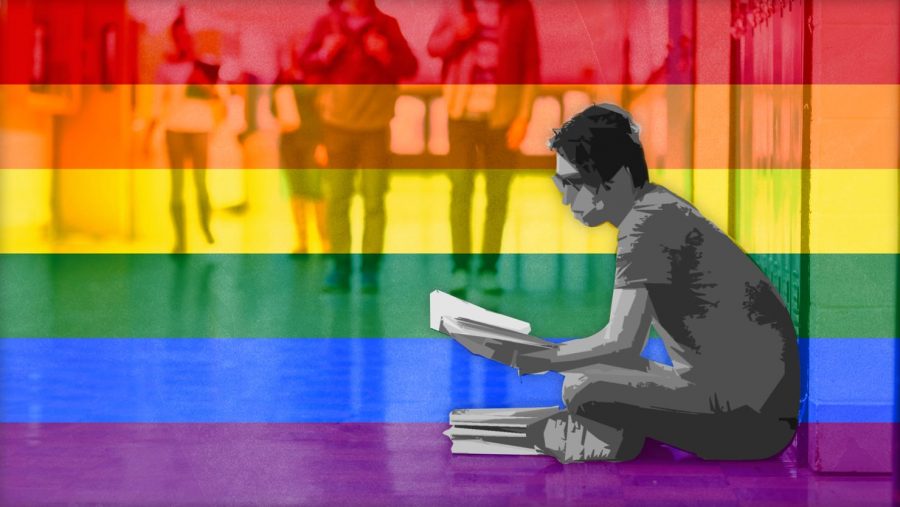LGBTQ+ Community
Althea Millman, Reporter
September 4, 2019
For many, there is a fine line between what should and should not be taught in school; however, there are certain important subjects that are going unnoticed simply because they fall on this line. The teaching of significant people and events in the LGBTQ+ Community is one of them. Subjects such as this stem from an area of taboo and are often considered inappropriate for the classroom and are consequently either grazed over in the lesson or even left completely absent.
The teaching of significant people and events in the LGBTQ+ Community is a controversial issue among teachers, students, and parents. The common concern is that this subject will influence the students in an inappropriate way, potentially making them more likely to identify with the LGBTQ+ Community. This concern that information about the LGBTQ+ will ‘rub off’ on students is not scientifically supported and can not be used to justify excluding this subject in the curriculum.
Additionally, there is an ongoing argument amongst teachers and parents about when students should be learning about this topic. Due to the extreme taboo surrounding the topic, the teaching of the LGBTQ+ Community’s history is put in the category of ‘mature content’ despite being just as factual and relevant as any other history subject.
This could be equivalated to the recently reinvigorated debate about the teaching of sex education in schools. In both situations, there are people who feel the subject is not appropriate for school and especially for younger children such as elementary students. However, all these people are doing is letting their own personal beliefs get in the way of children being educated on basic fact. Teaching about the LGBTQ+ Community has nothing to do with one’s views on the community itself but rather is simply about providing students with a well-rounded and inclusive education.
Senior classmate Mikayla Hatchell and history teacher Ben Searway were interviewed on this subject and discussed varying important components of the issue, including comfort levels, the importance of not excluding significant information from the curriculum, and the persistent taboo attached to the topic.
When discussing incorporating LGBTQ+ history into curriculums it is important to consider the teachers and students’ comfort level. Feeling comfortable both learning about (on the students’ side) and teaching about (on the teacher’s perspective) historically significant LGBTQ+ events and people is crucial.
Hatchell explains her view on how comfortable her classmates would feel discussing the LGBTQ+ community at school, saying “I think some would [be comfortable] and even if some aren’t comfortable with it I think it’s still important to learn…”
Searway goes into further detail on this idea, describing how his focus as a teacher is on the impact of the event or person regardless of the personal details.
“Can I teach [an] event as an event in history that we need to be aware of and what it’s showing? Yes. Because I don’t have to teach whether I agree with events or not but whether the impact of the event would be crucial.”
Regardless of comfort level however, the question that must also be asked is: is it acceptable, in terms of morality and the student’s education, to leave out pieces of history because they pertain to the LGBTQ+ community?
Hatchell tackles this question, pointing out that “…it’s excluding people and it is erasing any history or existence of those people.”
Just as you can not simply ignore events and people that have something to do with a topic you dislike, you also can not avoid the topic itself.
Touching on this, Searway says “I think people need to be challenged to look at other ideas out there or other topics that maybe they don’t feel comfortable with…”
“I try to tell my students, you don’t need to fear challenging ideas. It’s okay to have your cage rattled, because it will make you a stronger person in the end.”
Even though it can be seen that the history of the LGBTQ+ community is important to students’ overall knowledge of the world, the subject remains undeniably controversial and taboo. Both Searway and Hatchell commented on this and explained how it continues to be such a touchy subject because of the longstanding negative beliefs towards the community stemming from people’s different upbringings and religious affiliations.
Hatchell remarks that “…people have a hard time straying from the path that was made for them.”
Searway concludes with, “It’s still kind of off limits because [some people] really need to still think about where they stand on it [and] how they deal with it, especially if they have religious upbringings.”
In the past, the LGBTQ+ community has been left out of school’s curriculum across the U.S. or even purposefully banned from being apart of conversations in the classroom.
In fact, according to Lamda Legal’s FAQ’s about Anti-LGBT Curriculum Laws, “There are at least 7 states with anti-LGBT curriculum laws that expressly call out LGBT issues for disfavored treatment in schools: Alabama, Arizona, Louisiana, Mississippi, Oklahoma, South Carolina, and Texas.”
As grim as that may seem, progress is being made in other states.
For instance, as is mentioned in CNN’s article “LGBTQ history curriculum will now be taught in Illinois schools”, the state of Illnois has recently passed a bill that amends their public school’s curriculum so that “… the teaching of history shall include a study of the roles and contributions of lesbian, gay, bisexual, and transgender people in the history of this country and this State,”
With more states like Illinois making strides to incorporate LGBTQ+ history into their curriculums, other states may be more willing to do the same.
Whether more states will continue to incorporate the history of the LGBTQ+ community into the mandated curriculum is yet to be seen, but until they do there will always be holes in these impressionable students’s education and overall worldview.
